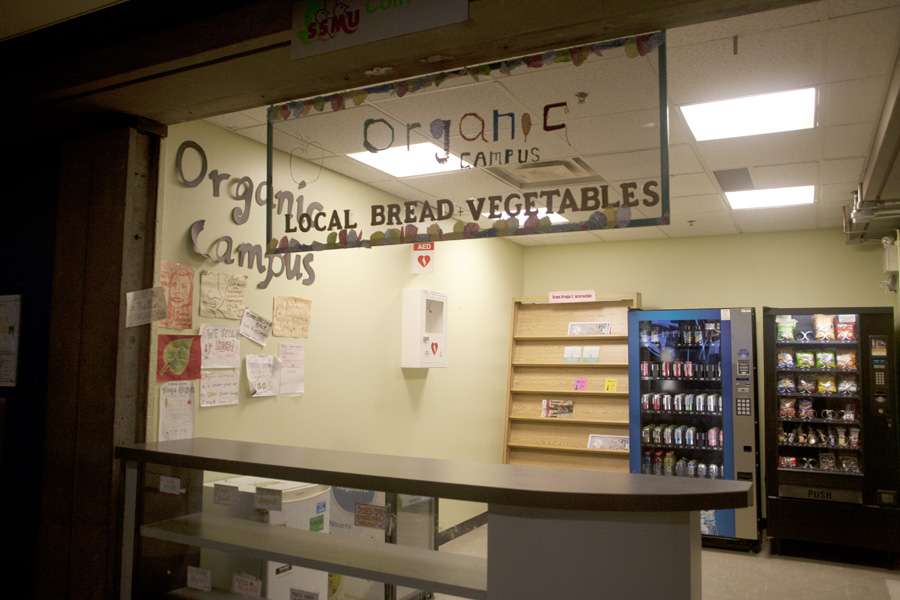This year’s Winter referendum period for the Students’ Society of McGill University (SSMU) includes 11 referendum questions. The voting period runs until 3 p.m. on March 21.
Organic Campus Fee
This question asks students to approve an opt-outable $0.22 fee per semester that would create a yearly stipend for Organic Campus, a service that provides low-cost organic goods for the McGill community.
The referendum question comes as the result of the collective’s current volunteer-only staff structure, which violates provincial labour laws. According to Quebec’s Act respecting labour standards, the tasks performed by Organic Campus volunteers constitute work and must be remunerated.
According to Ariela Lavana, a member of Organic Campus, the revenue that the service receives from sales is not enough to cover the cost of remuneration.
“We can’t run without the fee,” Lavanna said. “If there’s any possibility [that] we could extend our services, that would be the best case scenario; but as it is [the fee] is just to allow us to continue running as a service.”
The fee levy would not change the logistical structure or services of the collective.
TaCEQ
SSMU’s disaffiliation from the Quebec Student Roundtable (Table de Concertation Étudiante du Québec, or TaCEQ) is the subject of another referendum question.
TaCEQ is a provincial student association that SSMU helped found in 2009. This year, SSMU paid $17,000 in membership fees to TaCEQ. The organization has recently been criticized for its inefficiency, and one of its four student associations already left the federation in February.
SSMU members and elected representatives have criticized TaCEQ for the inaccessibility of its documents due to language barriers, as well as a lack of interest on the part of member associations in reforming the organization.
A “Yes” vote would make SSMU an association that is unaffiliated with any student lobbying group.
“We could choose what we want to do [and] focus on a few important [issues],” SSMU Vice-President External Samuel Harris said. “A lot of work can be done outside of a formal organization, on a [per] issue basis.”
Harris noted that SSMU would face additional challenges as an unaffiliated association.
“Assuming we stay independent, then we have to take the initiative and find people who support us,” he said. “We have to build relationships with associations we’ve never built relationships with before.”
University Centre Building Fee
This question seeks to create a non-opt-outable, per-semester fee of $6.08 for full-time students and $3.04 for part-time students to cover the cost of rent and utilities for the SSMU Building under the new rental agreement between SSMU and McGill. It also asks for a fee increase of 5.6 per cent per year to keep up with rent increases until the current agreement with the university ends.
According to the question, a “No” vote could lead to reductions to services that SSMU is able to offer.
According to Tyler Hofmeister, Vice-President Finance and Operations, this would include fewer events held in the building and the elimination of non-essential services such as the yearbook. A hiring freeze would also likely come into effect, which would prevent any new positions from being created.
“In the case of the no vote of this question, obviously this would impact the long-term financial sustainability of SSMU [and] greatly reduce SSMU’s ability to be a representative body,” Hofmeister said.
The fee is set to expire in 2021, when the lease agreement will end.
First-Year Council Fee
If approved, this question would create an opt-outable fee of $0.50 per semester for SSMU’s First-Year Council.
The First Year Fund would go toward initiatives such as student forums, community outreach, and greater collaboration between groups that represent first years of different faculties.
Élie Lubendo, Services Representative to SSMU and one of the movers of the motion, said the question has faced some criticism for creating a fee that will affect all students, and yet, only benefits first years.
“We’ve had a lot of questions regarding why we’re having fees [that] don’t actually reflect the entire community,” he said. “[While] most services are not used by all students, we pay [them] because we feel it is a need within the community.”
Legal Information Clinic
existence and fee increase
Two questions regarding the Legal Information Clinic at McGill (LICM) will also be put to student vote this week.
The first question asks students to support LICM’s continued existence of the service, which the McGill administration requires all services that receive a student levy to run every five years. The second question asks for an increase of LICM’s non-optoutable student fee from $3.25 to $4.50 per semester.
The current fee has not been increased since 2001, despite increased costs such as rent and software.
According to LICM Director of Communications John Hutchings, LICM needs the fee increase in order to continue operating at its current capacity.
“If we were to go ahead with our fee at the 2001 level, we would have to review everything and look at how we could cut corners,” Hutchings said. “We would have to reduce the amount of activity in the office because we didn’t have the equipment to do it. It could also mean that we might no longer be able to continue paying the rent for a private meeting room.”
LICM is a free legal information service for all members of the community. Its Student Advocacy Program offers legal advice and advocacy to students for disciplinary proceedings under McGill’s Code of Student Conduct. Its free commissioner of oaths service serves 750 students every year.
Other referendum questions
The remaining referendum questions ask students to renew existing fees—the Athletics and Recreation Facilities Fee, the SSMU Access Bursary Fund, the SSMU Ambassador Fund, the SSMU Campus Life Fund, and the SSMU Library Improvement Fund.










Pingback: SSMU and PGSS Winter referendum endorsements | McGill Tribune